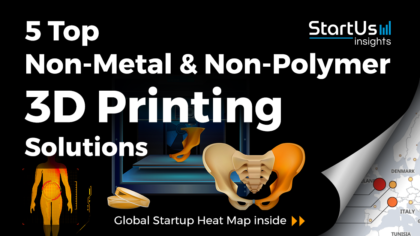Accelerate Productivity in 2025
Reignite Growth Despite the Global Slowdown
Staying ahead of the technology curve means strengthening your competitive advantage. That is why we give you data-driven innovation insights into the materials industry. This time, you get to discover 5 hand-picked startups developing non-metal & non-polymer 3D printing solutions.
Global Startup Heat Map highlights 5 Top Non-Metal & Non-Polymer 3D Printing Solutions out of 75
The insights of this data-driven analysis are derived from the Big Data & Artificial Intelligence-powered StartUs Insights Discovery Platform, covering 2.093.000+ startups & scaleups globally. The platform gives you an exhaustive overview of emerging technologies & relevant startups within a specific field in just a few clicks.
The Global Startup Heat Map below reveals the distribution of the 75 exemplary startups & scaleups we analyzed for this research. Further, it highlights 5 materials startups that we hand-picked based on criteria such as founding year, location, funding raised, and more. You get to explore the solutions of these 5 startups & scaleups in this report. For insights on the other 70 non-metal & non-polymer 3D printing solutions, get in touch.
Copper3D prints Antibacterial Nanomaterials
The COVID-19 pandemic has triggered an inflow of techniques for disinfection and sanitation. As most of the surfaces and things people use in their home and workplace are made of metals, plastics, and wood, regular surface sterilization using disinfectant is necessary. Apart from the viral transmission, it is always beneficial to clean the surfaces to get rid of fungal and bacterial infections. However, cleaning and sanitizing activities take time and manpower for large organizational spaces. Thus, if things are made of self-cleaning or antibacterial materials, it ensures the required safety standards and prevents infections. That is why many material and biomedical startups are working on novel materials with antimicrobial properties.
US startup Copper3D develops antibacterial nanomaterial for 3D printing. The startup’s PLACTIVE AN1 is a patented nanocomposite material. It is proven to have antibacterial action against MRSA and is also tested against the Human Coronavirus strain 229E. PLACTIVE AN1, as well as Mdflex, are based on nano-copper or cuprous oxide. The startup uses the antimicrobial flexible material to print mobile covers, face masks and is tested by NASA to be used for ISS missions.
Freeform Composites works on Additive Manufacturing of Carbon Composites
Conventionally, most industrial parts are made by molding metals or plastics, which generally is a non-flexible process. The advent of additive manufacturing improves the efficiency of production of industrial components with a reduced time span and the effective use of resources. Although innovations in printing technology are instigated, the efficiency and development of novel properties of printing materials are necessary to improve product functionality. Carbon composites, for example, have major advantages over conventional materials including increased stiffness, strength, and decreased weight. Further, carbon fiber composites are corrosion and stress-resistant, offering high flexibility and thermal stability. These properties show that carbon-based composites are potent alternatives to metals and polymers.
Australian startup Freeform Composites designs a proprietary binder jet 3D printing process and material for the same. The startup uses carbon composites for industrial additive manufacturing. The carbon composite developed by Freeform is ultra-lightweight and is mechanically strong. Thus the eco-friendly material can be used to print components for applications in aerospace, automotive, and healthcare.
3D Strong uses Carbon Nanotubes (CNTs) for 3D Printing
The advent of next-generation technologies in telecommunication, healthcare, and automotive creates a demand for versatile materials for the production of sensor and electronic components. Structural properties of sensor materials used for fabrication define the performance of a sensor. As metal-based nanoparticles are used currently, there is a great opportunity for advanced materials to achieve superior performance and cost-effectiveness compared to their conventional counterparts. Although many startups are working on materials like carbon nanotubes, it is difficult to attain increased length using existing production technologies. Thus, advanced synthesis technologies enabling long CNT production are being developed.
Latvian startup 3D Strong prints various components and parts required in different industries using carbon nanotubes. The startup modifies CNT into liquid ink for 3D printing. 3D Strong’s CNTs increase conductivity and material strength, as well as remove static currents. The startup also develops a chemical vapor deposition reactor to synthesize arrays of aligned CNTs. This enables the production of CNTs with a length of 40 to 800 microns, making it suitable for use cases including micro, nano-electronics, nanosensors, and many more.
Particle3D uses Biodegradable Ceramics to Print Bone Implants
Bone implants are primarily made of metal due to its load-bearing capacity. However, the limitation of using metallic implants is their high elastic modulus which cause stress shielding. Moreover, continuous exposure to the metal leads to toxic side effects from the metal ions released. Therefore, 3D printing starts to play a major role in prosthetic manufacturing to enable the production of precision implants made from advanced alternative materials thus increasing adherence to tissues and enhancing cell growth.
Denmark-based startup Particle3D prints patient-specific bone implants called P3D Bone PSI using proprietary technology. The personalized bone implant is designed from the patient’s MRI/CT scan and 3D printed to perfectly fit their requirements. To manufacture the implant, the startup uses patented ceramic material, creating porous and degradable alternatives for bone replacements. In addition, Particle 3D produces bio-ink, composed of ceramic powder suspended in a fatty matrix.
Kosmos Health develops Bioinks using Plant Protein
3D bioprinting is an emerging field and has started providing solutions that are applicable for industries such as healthcare, food tech, and more. An important requirement for 3D printing is a scaffold. Scaffolds provide a backbone architecture as the primary base for the growth of new cells and tissues. The scaffolds and growth proteins used today are primarily animal-based, which increases the cost of the process. Besides, animal protein is highly non-reproducible and printable. Thus, an alternative medium for 3D printing is required to accelerate the scalability and utilization of the technique for multiple bioprinting purposes.
Singaporean startup Kosmode Health provides materials for plant-based product development and cell culture companies. The startup develops a novel plant-based bio-ink for 3D printing. Kosmos Health uses a triple technology platform to source, formulate and print plant-based scaffolds conducive for cell growth in cell culture techniques. Plant Protein Composite (PPC) Bioscaffolds are natural proteins and a direct substitute for animal-based scaffolds. Moreover, PPC bioscaffolds are 3D printed in sub-micron scale precision using the startup’s proprietary 3D scaffold printing methodology.
Discover more Materials Startups
Materials startups such as the examples highlighted in this report focus on advanced composites, lightweighting, nanotechnology as well as smart materials. While all of these technologies play a major role in advancing the materials industry, they only represent the tip of the iceberg. To explore more materials technologies, simply get in touch to let us look into your areas of interest. For a more general overview, you can download our free Materials Innovation Report to save your time and improve strategic decision-making.


![10 Top Startups Advancing Machine Learning for Materials Science [2025]](https://www.startus-insights.com/wp-content/uploads/2025/06/Machine-Learning-for-Materials-Science-SharedImg-StartUs-Insights-noresize-420x236.webp)
![10 Emerging AI Solutions for Material Science [2025]](https://www.startus-insights.com/wp-content/uploads/2025/06/AI-Solutions-for-Material-Science-SharedImg-StartUs-Insights-noresize-420x236.webp)




